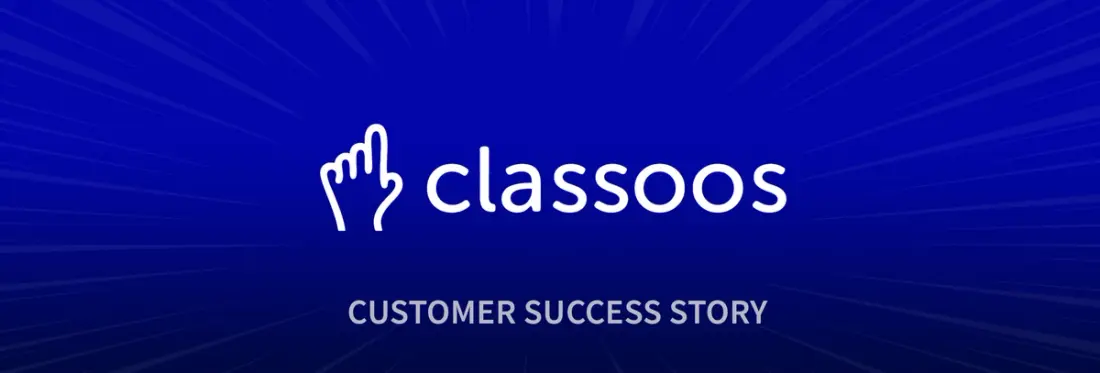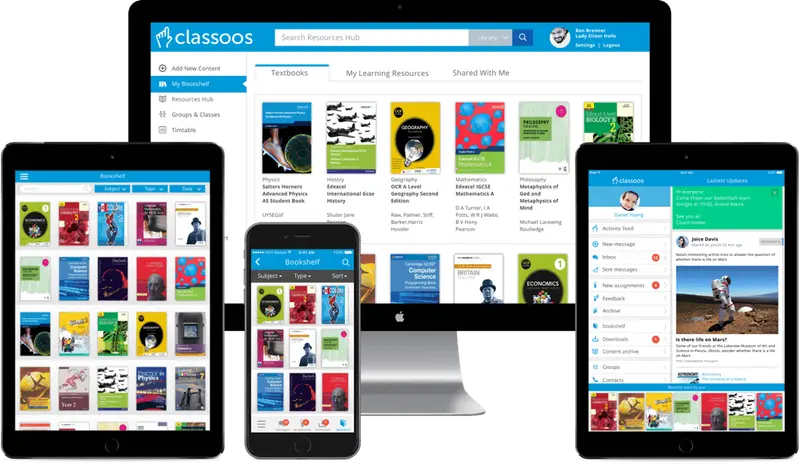Adam Pez
Updated March 10, 2025
7 min
Success Story: How Kalsefer Streamlined Cross-Platform DRM Security with Apryse SDK
Adam Pez

Kalsefer Digital Solutions launched in 2012 with a vision: the Israeli startup wanted to transform schools and lighten backpacks everywhere, by enabling students to take their learning with them on their tablets and their smartphones.
Six years later, Kalsefer’s all-in-one learning platform and Digital Textbook Service, classoos™, has made K-12 textbooks totally digital and on-demand, similar to what Netflix has accomplished with movies and TV. Over 50,000 students and teachers now log into classoos every semester to access their learning materials in PDF format.

Delivering proprietary PDF e-books to tens of thousands of students, while keeping prices reasonable, requires careful management of digital rights, according to Kalsefer Co-Founder and CEO Avshi Segev.
A hack of our system, where a user downloads and redistributes our textbooks without paying, could be catastrophic for us. It would be far worse than just a loss of revenue. We would be exposed to lawsuits by publishers and more importantly, our textbook vendors would no longer want to work with us.
– CEO Avshi Segev
But the company struggled to find the right PDF viewer that would secure DRM cross-platform and simplify cross-platform development for a small team—without imposing extra costs and limitations. With their previous solution, for example, students as young as 10 had to use an Adobe ID and an email account to securely access their textbooks.
“The amount of support hours we spent around Adobe ID was really too much and was really hurting us,” said Segev.
Eventually, and for a number of reasons, the company decided to look for a better fit. Kalsefer now uses Apryse SDK to secure DRM across its entire PDF experience, including on web browsers, and Windows, iOS and Android devices, using the Apryse Core SDK, the Apryse WebViewer, Xamarin, and Windows UWP.
Kalsefer’s Business Challenges
- Kalsefer wanted a single solution that would simplify cross-platform development and cross-platform DRM security
- Their previous solution had problems that made it difficult to grow their business
- An unreasonable support burden related to issues with Adobe ID
- A licensing model that was not reasonable given classoos’ growing user base
How Apryse Solved These Challenges
- Implemented DRM security cross-platform, without the need for an Adobe ID and an email address
- Streamlined cross-platform development with a single PDF SDK, including use of Xamarin and Windows UWP
- Offered a licensing model that aligned with Kalsefer’s needs
- Provided for a closer vendor partnership and a superior level of service
The Benefits of Apryse
- Eliminated 50% of classoos’ support caseload and its #1 support ticket
- Reduced operational expenses and textbook prices
- Enabled download of encrypted e-books for offline reading on mobile devices
- Enabled reading of textbooks securely in a browser with the Apryse WebViewer
The Demands of a Digital Textbook Service
When Kalsefer initially looked for a PDF viewer, it had several requirements in mind.
PDFs from publishers could range from 20 to 500 pages, and 20 to 50 megabytes, and include a variety of column layouts and memory-intensive sidebars and images. A viewer would have to deal with variety of textbook sizes and textbook compositions, and still load pages quickly and reliably.
Furthermore, e-books would need to be encrypted for download, ensuring secure offline use in schools with patchy wireless internet—and for students on the fly.
In addition, Kalsefer needed to be able to customize the solution to enrich and streamline the reading experience—including for example, custom features for students and teachers to easily add, hide and share their PDF annotations.
Lastly, facing a “patchwork” of device standards in schools, Kalsefer would need to support a variety of platforms, including school-supplied tablets and laptops, student cellphones, an archaic home or library computer, and more. Kalsefer preferred a single vendor for its diverse cross-platform requirements to reduce development time and costs.
“Maybe big companies can absorb the costs of maintaining three-to-four different relationships with different vendors, each with a different code base, a different road-map and different problems. I’m not saying it isn’t possible,” said Segev.
“For a company like us, however, from a cost perspective and an operational perspective, having a single point of contact is critical.”
DRM Security - Their Previous Solution
Prior to Apryse, Kalsefer selected an Adobe SDK reseller as its single point of contact. And through this reseller, Kalsefer was able to build a desktop and mobile tablet reader with server-side encryption of PDF files. Students could download and safely read these PDFs, while the Kalsefer app would enforce DRM, gating access based on criteria like license duration, who opened a PDF and on what devices(s).
Nevertheless, the reseller proved unsatisfactory for several reasons:
First and foremost was a security authorization process with additional steps that proved inappropriate for Kalsefer’s use-case.
“Many of our users are kids, as young as 10, 11 or 12 years. And kids these days are often savvy with the social media apps they use to communicate, especially Instagram and Whatsapp. But they do not necessarily have or know how to use an email account.
“And picture this: for students to log in to get their books, they needed an Adobe ID. And to get their ID, they needed an email account.
“Having to use the Adobe ID proved very difficult. And at the time, there was no way around it.” He added: “We did not anticipate very well at the outset the trouble this would create for us.”
Pretty soon, support tickets related to Adobe ID were flooding in, becoming Kalsefer’s number-one support issue, and a huge support burden, accounting for around 50 percent of the company’s total caseload, according to Segev.
Another problem was a PDF SDK licensing model that limited Kalsefer’s ability to add new users. Unable to recover these SDK licensing fees from customers, Kalsefer shouldered much of the cost itself.
But the final straw, according to Segev, was when developers also complained to him that the level of service was not as good as they expected.
“It was the support costs and issues with the service; and from my side, it was looking at the bills and thinking about our licensing fees. All those three things together gradually convinced us of the need for change.”
Securing DRM Cross-Platform in Fewer Steps with Apryse
When Kalsefer set out on its second evaluation, Segev said this time they wanted a solution that would scale with their business, from a vendor who could support all their current and future PDF requirements.
“It is imperative for a company like us to know we’re working with a solution that would be able to support us to where we’re going,” said Segev.
Kalsefer quickly zeroed in on Apryse, and they were able to deploy it seamlessly within a matter of days.
We were already in the market, and it was important that when we made the change, it didn’t cause any service interruptions for our users. Happily enough, working with Apryse, the transition was as small as we could expect; our users never felt it, except that they no longer needed to sign in with an Adobe ID.
– CEO Avshi Segev
With Apryse, Kalsefer could still perform encryption server-side for mobile and offline reading—but without the extra steps and limitations of their previous SDK. Kalsefer also streamlined development of its native apps, including a new Windows mobile and desktop application, using Apryse’s integration with Xamarin and Windows UWP.
And with the Apryse WebViewer, the company finally achieved a long-held ambition:
“Before students were always able to browse and preview their books on the website; it had always been our vision to have books read online as well,” said Segev.
Apryse’s WebViewer now allows Kalsefer to stream linearized textbooks into a browser—similar to how YouTube videos are streamed in—without long waits for buffering. This allowed for an uninterrupted reading experience, regardless of textbook file-size or complexity; meanwhile, Kalsefer has retained complete control over what content is cached browser-side, ensuring they can secure DRM across their entire user experience.
How Apryse Enables Growth
Now with Apryse as its single point of contact, Kalsefer has registered several improvements to its Digital Textbook Service—and Segev said he’s feeling much more confident about their ability to grow.
Apryse eliminated Kalsefer’s number one support ticket— issues relating to Adobe ID—cutting the company’s support burden in half virtually overnight. And with a new flexible licensing model, Kalsefer was able to reduce operational expenses and pass these savings onto customers in the form of reduced textbook prices.
“If somebody were to ask me about a vendor—on a technical, personal and commercial level—my advice would be to go with Apryse.
“Apryse really removed from our table any concerns about our ability to scale. They really know what they’re doing and they have the experience to support us. It feels good to have someone we know we can stick with.”
If you have any questions about how Apryse SDK can help enable growth for your organization, please feel free to get in touch!
About Kalsefer
Kalsefer is a leading provider of advanced mobile digital learning solutions for the education industry.
classoos provides an enhanced mobile education platform. Launched in the UK in 2017 by experts in technology and education, classoos is built off a vast experience in software creation, content development, and education. Learn more at www.classoos.com.


